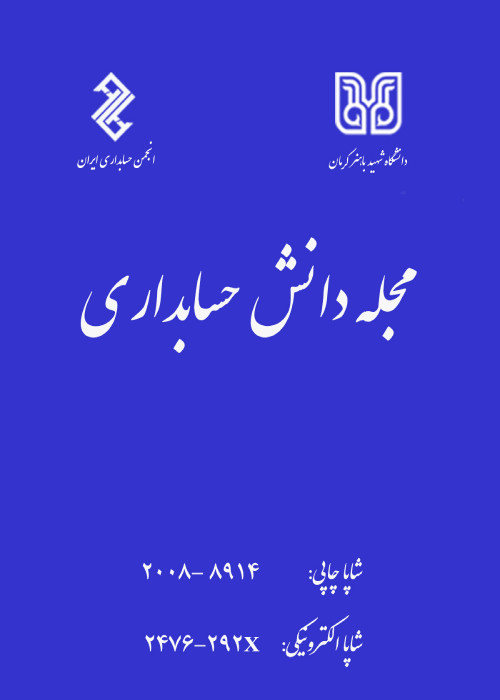Designing a Metaphor Functional Model of Dialogic Accounting: by Grounded Theory and Fuzzy Interpretive Matrix Analysis
Today's field of accounting knowledge, due to social changes, is an area that needs to be transformed in terms of promoting a focus on interaction with stakeholders. In fact, achieving a coherent and interactive understanding between the pillars of the accounting profession and stakeholders is always considered a futuristic perspective of the social context in this area that should be considered. Due to such support, the accounting profession has sought to develop accounting metaphors in recent years, inspired by critical analysis or pragmatism analysis. In a simple definition, metaphor can be considered as a process of connecting the knowledge-enhancing functions of an interdisciplinary field in the humanities, which helps to establish a concept in the form of a scientific paradigm in that field. The purpose of this research is designing a metaphor functional model of dialogic accounting by grounded theory and fuzzy interpretive matrix analysis.
The methodology of this research was mixed and used in the qualitative part of the grounded theory analysis based on Glaser's approach to formulate the model and in the quantitative part of the fuzzy structural interpretive analysis. In fact, the purpose of the analysis in the qualitative part was to present the model and in the quantitative part was to determine the most influential component identified in the data analysis of the foundation. The target population in the quality department was 12 academic specialists who were considered experts, both scientifically and empirically. The process of selecting individuals was a theoretical sampling method based on empirical knowledge in the auditing profession. However, the target population in the quantitative section was 25 managers of the accounting department of capital market companies who were selected based on work experience and the level of technical and specialized knowledge through improbable sampling. This number of participants was approved because of the nature of the fuzzy interpretive matrix analysis, which emphasizes the limited number of participants in the research.
The results of the research in the qualitative part indicate the existence of 3 categories, 6 components and 36 conceptual codes that have laid the foundation for the metaphorical function of dialogic in accounting in the form of an integrated hexagonal model. Then, with the aim of determining the reliability of the research dimensions, Delphi 6analysis was used, which based on the two criteria of average and agreement coefficient, all 6 main components determined in the research model based on the agreement coefficient; the mean and standard deviation are confirmed. In other words, considering that the average of the main components was 5 and above 5, and on the other hand, because the agreement coefficient obtained is more than 0/5 and the standard deviation was below 1, it should be stated that all the main components of the research were approved. Also, the results in a small part of prioritizing the components of dialogic accounting in 5 levels of the matrix model indicate that the fifth level was the most influential component and the first level was the least effective component related to each of the research categories. Therefore, it was found that the component of the standardization normalizing trust in accounting knowledge "X1" as a criterion of the category of cultural mechanism of discourse accounting to users is the most influential component of dialogic accounting.
Accounting knowledge, which has an institutionalized existential philosophy towards a society and its stakeholders, is considered to have an effective role in creating trust and can lead to an effective system of accountability and responsibility for legitimacy among stakeholders. Since dialogic accounting, in its essence, requires symbolic approaches to reach arguable norms and common knowledge between itself and the stakeholders, trust is a consequence that can occur in the presence of this metaphor or allegory (dialogic) in accounting. In fact, dialogic accounting, in its structured norm form, contributes to common understandings in accounting perception and causes the nature of dialogic accounting of symmetric information capacities to be promoted in decision-making for users. Also, social integration, due to the formed norms based on trust in accounting, is able to create mutual perceptible capacities for the operators of this profession, i.e. accountants, in terms of understanding the needs of users with social realities and changes, and the ground for the modification of financial reporting standards as a set of functions. Provide accounting. On the other hand, the norm of trust in accounting based on the cultural content of dialogic accounting helps to strengthen the reasoning symbols in the form of a common language and causes justice in the use of information based on its procedural dimension in accounting to take a more coherent form and causes the proportionality of the functions of this knowledge with the needs and expectations of stakeholders. It was also found that the value-oriented functions of future accounting, as another component of the cultural mechanism of dialogic accounting, is ranked second in terms of influence from the metaphor of dialogic accounting, which will lead to the development of future perspectives of accounting knowledge based on interaction with stakeholders in social contexts. Therefore, in line with the theoretical framework of Litteljohen and Fosse (2011), future accounting values depend on the dynamics of the company's interaction cycle with stakeholders through financial instruments and information feedback.
- حق عضویت دریافتی صرف حمایت از نشریات عضو و نگهداری، تکمیل و توسعه مگیران میشود.
- پرداخت حق اشتراک و دانلود مقالات اجازه بازنشر آن در سایر رسانههای چاپی و دیجیتال را به کاربر نمیدهد.


